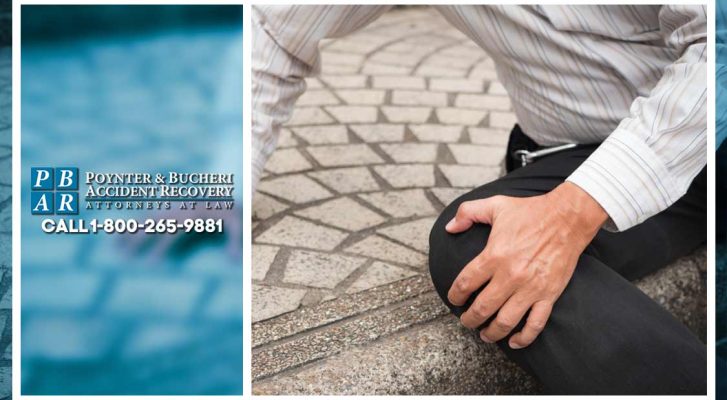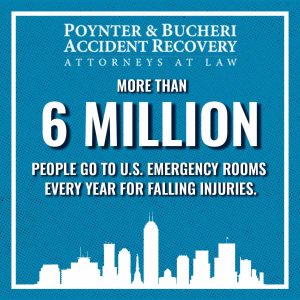
Proving Fault in an Indiana Slip and Fall Accident

If you slip and fall on someone’s property, it might seem obvious that they should pay your medical bills. This isn’t automatically the case. A homeowner, business owner, or landowner isn’t obligated to pay for your slip and fall injuries unless you prove they were at fault for what happened. As soon as you are injured it’s important to call a slip and fall attorney in Indianapolis. Here’s what you need to know about proving fault to make a successful claim for slip and fall accident compensation.
How Do I Prove Fault in a Slip and Fall Case?

More than 6 million people go to U.S. emergency rooms every year for falling injuries. Falls are also the nation’s second-leading cause of unintentional injury-related death, showing how serious falls can be.
Many of these falls aren’t the fault of the injured people. They didn’t just trip over their own feet, unexpectedly faint, or fail to watch where they were walking. Something on someone’s property caused them to fall.
Proving fault takes more than just showing who owns the property. To prove fault in a slip and fall case in Indiana, an injured person must show:
- The property owner knew about the hazard.
- The hazardous condition caused the slip and fall injury.
A hazardous condition is a type of object or obstacle that was improperly located and directly caused you to slip and fall. It could be something like an oily residue, slippery ice, a crumbling pothole, a foreign object, or a floor so filled with clutter you had no safe walking path.
As the injured person, you aren’t legally required to see or recognize the hazard before your fall. For example, you might not be aware of a pothole in a poorly lit parking lot until you’ve already fallen across it.
After your injury, identify the object and determine how it contributed to your fall. Ideally, you should immediately take photos and videos of the entire area of your injury to preserve a record of the conditions at the time of your accident.
You’ll need your medical bills to show that your injuries are a direct result of your slip and fall accident. If you have expensive bills from a broken leg, hip injury, back injury, soft tissue injury, or other slip-and-fall accident injuries, gather your medical documentation and share it with your attorney.
If you have endured extensive pain and suffering since your accident, you may also be eligible for pain and suffering compensation. Ask your attorney about seeing a slip-and-fall complaint example to help you understand the many types of information you’ll need to include in your claim.
What are the Indiana Slip and Fall Laws?
In addition to those discussed above, other legal concepts may impact your case.
The other side may file a Motion for Summary Judgment, which is a request to throw out the case based on a failure to meet the basic standards of proof. If granted, a Motion for Summary Judgment is final and ends your case. It’s essential to prove that the property owner knew about the hazard and the hazard caused your injury.
Proving the property owner knew about the hazard may be difficult and calls for a slip-and-fall accident attorney’s help. The legal term is “notice,” and you’ll need to show that the property owner had prior notice about the hazard and didn’t either fix it or provide a warning to visitors.
The law provides a level of fairness to the property owner, meaning they must have had a reasonable opportunity to know about and fix the hazard before the incident occurred. If you can show that they allowed the hazard to persist for months before your accident, this may be considered “constructive knowledge” since the property owner had time to become aware of issues on their property.
Someone may have notified the property owner about the conditions. For example, your attorney might locate previous property inspection reports or city notices warning the property owner about dangerous conditions.
A business owner sometimes attempts to avoid fault by claiming the hazard was merely a temporary condition like falling snow. Commercial property owners don’t have to remove snow and ice moment by moment. They get a reasonable amount of time to remove it but can’t allow it to persist and create unsafe conditions for too long.
A property owner might even claim you were a trespasser on their property. Although the law doesn’t require a property owner to always pay for a trespasser’s injuries, Indiana still requires property owners to avoid willfully injuring trespassers or increasing the possibility of harm. It will help your case if you can show that you were an invitee or licensee who was present with permission.
Poynter & Bucheri Accident Recovery – Slip and Fall Attorney, Indianapolis
As you can see, the law contains many provisions, and there are many nuances to proving fault after you slip and fall on someone’s property. To learn more about your options and request a free case review, contact a slip and fall attorney, Indianapolis: Poynter & Bucheri Accident Recovery, at 1-800-265-9881.
